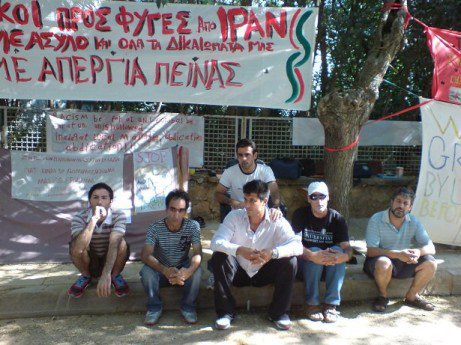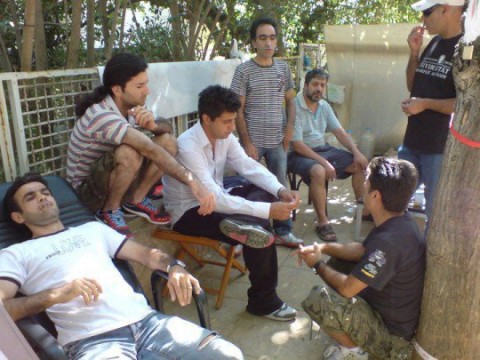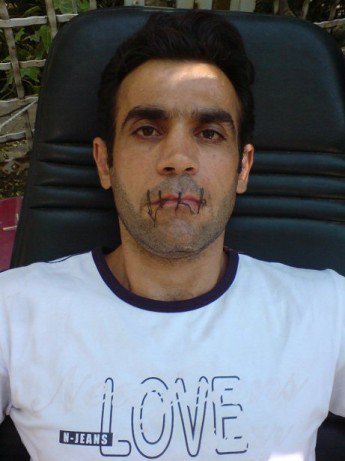Update 2: Victory!
Just found the information on the UNHCR website. We wrote:
We were discussing with a lawyer here in Greece, and she said that she would find it highly unlikely if they received political asylum, since the actual asylum system has been suspended. The Ministry of citizen protection itself has pointed out that it cannot brake the law by giving asylum based on a suspended presidential decree and said that only in September, when the new presidential decree would enter into force, asylum could be granted.
The UNHCR says:
Given the imminent threat to the health and lives of Iranian asylum seekers continued hunger strike in front of the Office of the High Commissioner of UNHCR, the Ministry of Civil Protection has decided yesterday to activate the Appeal Board for the accumulated applications provided by Presidential Decree 81/2009, “on humanitarian grounds and very exceptional, […] despite the government’s steadfast position that the current asylum procedure is impractical, ineffective and outdated.
So yes, our doubts were right, and yes, they did indeed get a proper asylum status. That is very good. Congratulations, we are so happy that all went well in the end! Why did our friends have to take such drastic measures in the first place?
#END OF UPDATE 2
Update 1: Victory?
Today, on the 30th of August, there was the announcement that the six of the seven hunger strikers will obtain political asylum, and that the seventh might likely receive it tomorrow. That would be a huge success. The hunger strikers have since been brought to the hospital, and we are very lucky that the hunger strike is concluded.
You notice the question mark in the headline? We were discussing with a lawyer here in Greece, and she said that she would find it highly unlikely if they received political asylum, since the actual asylum system has been suspended. The Ministry of citizen protection itself has pointed out that it cannot brake the law by giving asylum based on a suspended presidential decree and said that only in September, when the new presidential decree would enter into force, asylum could be granted.
So we were wondering if the hunger strikers were granted humanitarian protection rather than asylum? That would leave them in a much more difficult status, since it would not allow them to leave Greece as some hunger strikers have wished, and the access to social support in Greece would also be much more precarious. We really do hope that the hunger strikes did obtain a proper refugee recognition, and we will continue to look for more precise information. If you know something, please post it in the comments.
#END OF UPDATE 1
Since 13 days seven Iranians are on hunger strike in front of the UNHCR office in Athens. Two of them are in their 32nd day, and you can find previous reports here, here and here + video + video.
We went to see the hunger strikers, and this is our account:
One hunger striker, Seid Rouhollah (28) was deported from Germany back to Greece one and a half years ago under the Dublin II system. He came to Greece via Mytiline, Lesvos, in one small boat with 26 persons. He was the only survivor when the Greek coast guard punched a hole in their dinghy. Seid is a good swimmer, so he managed to survive, but since than he is afraid of the sea and in his nightmares he sees black bodies drowning in the sea and he can’t do anything – just save his own life.
Seid managed to leave Greece after three months. He arrives in Germany where he gets caught in the airport. He spends another three months in detention camp and is finally deported to “Grieschenland” (the word for Greece in a particular German accent). And “Tschüüüss” the german word for bye-bye he still remembers as the police said to him at the deportation. They also told him that it would be nice in Greece, because of the fine weather. He says: Maybe for vacation it is nice.
They say: Don’t worry, now they will care for you!
He arrives at Athens airport. They keep him imprisoned for 20 days. It is totally overcrowded, 20-30 persons in one cell. Only once a day there is food: ‘Malakas’ they say and they feed us like animals.
There is no shower and when he leaves he has scabies.
They issue him a Pink Card. Go, go!
they say and he has no shelter and no money. He contacts the Greek Refugee Council, but they say he shoud come again after one week. Since one and a half year now. There are not enough places in the shelters and since Seid is an adult man, he is not considered especially vulnerable. He has slept in a park since then. He says he had been waiting for the chance the hunger strike now gives to him, to finally make his voice heard.
Sadegh is in Greece since the beginning of 2001, he entered Greece through the land border in northern Greece. Several times he faces refoulement (i.e. illegal deportation) to Turkey until he finally manages to reach Athens. He tries to apply for asylum. It takes two years until his application gets registered and he is issued a Pink Card. but they do not listen to his story, there was no asylum interview since then, he is waiting for the prcedure to just start more than 7 years now.
Look, i have seen much in these ten years, it’s not a game! They are coming from Asia and Africa, everyone with their own stories and they want to have a future and they are not broken when they arrive. In Greece I see the African women becoming prostitutes and the young Afghan boys who have to sell their bodies to men. The young boy who was killed by a bomb blast, he was a refugee looking for food in the garbage. And now they say they are sorry for what happened to him but nobody asks why he had to look for food in the garbage. The world should see what happens here it is a humanitarian catastrophe and we want to see human rights watch here to document these brutal violation of human rights. Five persons got killed only in the cue to get the pink card since I wait there.
The UNHCR was not the right address for our protest, they do nothing! Always they say we should wait and that they have no possibility to help us and that the asylum system will be renewed, but this will take some time. How long will it last? Nobody knows.
Maybe they will move to another place with their protest. A friend who translates and himself was deported from Belgium some years ago adds: If I would join, I would strike in front of the Belgium embassy, because they deported me back here!
There is one action taken by the Greek police that shows the whole ignorance of their situation as political refugees. It was the 20th day of the hunger strike of the first strikers, before the others joined in. The Iranian embassy is very close to the UNHCR’s office and it was this day, that two police officers played a macabre joke. They picked one of the Iranians and forced him to walk in front of the Iranian embassy. To present him like a trophy. The embassy-members applaud and take some photographs. The Greek police then takes five refugees to the police station to check their papers and try to frighten them, so that they never come again to that place. They return and they join the hunger strike three days later.
Compared to the former hunger strike of Iranians that started in October 2010 (see: http://www.demotix.com/news/186915/iranian-asylum-seekers-hunger-strike-athens), this time it seems to be even more complicated to get concrete results. The UNHCR has given a kind of helpless statement, in which they support the claim for quicker results in the asylum procedures, and they declare to understand their problems. But nothing else (see: http://www.unhcr.gr/Press_Rel/2010/pi05-08-2010.htm)
The strikers think about changing their demands: If Greece is not able to solve their problems and if they cannot be saved from Iranian secret service, they ask to be transferred to another European country. Their main demand is to find a place where they can be safe, where their situation as political refugees is respected and where they find a shelter. It is not important if in Greece or in any other country of Europe they say. But they also say they lost their hope, that Greece will be able to really improve the asylum system, as it is one of the poorest countries of Europe and because Europe sends money for border security to fight the refugees with Frontex but not for shelter and food for the ones who arrived or have been sent back to Greece.
We will bring Seid’s poster with his demand for human rights watch back to Frankfurt. At least make his voice heard. I will write ‘Tschüss Grieschenland’ on it.
Seid says and finally there is a smile in his tired face.
We hope that they will be alive when we return to Athens within two weeks and that we will see some results. We fear for your health and your lives! We wish the best for you and we will try to spread your voices, whatever will happen. We hope to see you again in a better condition, finally to say welcome to Europe! And to mean it honestly as it is necessary like bread and water for us to meet you and to invite us all together to start to exchange how Europe will have to look like in the future. We need all the history of struggles, with their luckiest moments and also with all their failures and desperate moments to learn what to change. But also with a smile of Seid when he turns around the word Tschüss
, while we will say goodbye to the ancient and cruel European border system. We hope to see you again, not in hunger strike any more, but sitting at a table, eating together and exchanging ideas for the future!






